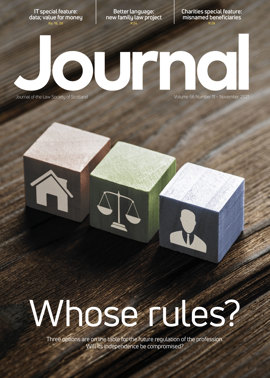Debt solutions and the impact on executries

Debt, and the Scottish statutory solutions that exist to deal with individual overindebtedness, has the perpetual attention of the Scottish Government and the wider Scottish Parliament.
In 2018 the Scottish Parliament’s Economy, Energy & Fair Work Committee refused to approve legislation replacing the common financial statement with the standard financial statement as the statutory common financial tool (CFT) in Scottish legislation. In response, in December 2018 Jamie Hepburn MSP, the Minister for Business, Fair Work and Skills, established the Scottish Statutory Debt Solutions Discussion Forum.
The Forum enables stakeholders, including insolvency practitioners (IPs), creditors and the advice sector, supported by officers from the Accountant in Bankruptcy (AiB), to discuss current issues around Scotland’s statutory solutions for personal insolvency and debt management.
PTD consultation
Following its consideration of the CFT and because of concerns arising therefrom, the committee turned its attention to protected trust deeds (PTDs) at the end of November 2019, conducting a short, PTD-focused inquiry in January 2020.
In May 2020, the committee published its recommendations and the Scottish Government responded in October 2020. A three-stage approach to review, improve and/or change was agreed, starting with introductory round table discussions, which will lead ultimately to a full review of the purpose and functionality of Scottish debt solutions.
Stage 2 saw the establishment of three working groups, tasked with the specific remit of considering PTDs, bankruptcy and diligence. The Society and the Insolvency Practitioners Association (IPA) are represented on group 2, considering certain of the committee’s areas of concern regarding PTDs. The discussions are wide ranging, reflecting divergent points of view.
PTD Protocol
In direct response to the committee’s report on PTDs, the AiB, working with the IPA as the foremost regulator of IPs providing PTDs, developed and introduced a new PTD Protocol, introducing operational changes to immediately address some of the committee’s recommendations.
Intended to promote good practice, improve transparency and enable trustees to manage debtor and creditor expectations in a PTD, trustees signing up to the Protocol agree that wherever practicable:
- an interim dividend should be paid to creditors 12 months after commencement, and quarterly thereafter;
- should a trustee decide to withhold the debtor’s discharge from the PTD, the trustee must first obtain the AiB’s agreement; and
- IPs may only accept trust deed referrals from FCA-approved lead generator firms.
To date, eight firms have signed up, but with a reach of more than 80% in terms of the volume of providers.
Death of a debtor subject to a PTD
The committee took evidence on one specific case in which the debtor had died leaving behind a number of ramifications of an extant PTD for their beneficiaries. Group 2 was asked to consider whether PTD arrangements strike the appropriate balance between creditors and family members when a debtor’s death occurs during a PTD.
If a debtor dies during their bankruptcy or PTD, there is no change in the statutory requirement for the trustee to deal with assets of the estate. The trustee is still required to deal with creditor claims ahead of recognising any rights and entitlements of beneficiaries, per s 129 of the Bankruptcy (Scotland) Act 2016. The principle that creditors get paid ahead of beneficiaries or partners is well established – the law recognises that debt is a responsibility and that wherever possible, creditors should be repaid ahead of any individual benefitting in a personal capacity, as a beneficiary. The group agreed that the repayment of debt to creditors ahead of beneficiaries from a deceased’s estate is well established in different areas of the law and unanimously agreed that no changes are required to this principle.
What should executors do?
Group 2 recommended that the Scottish Government publication What to do after a death in Scotland be amended to explain the process where a debtor dies while subject to a PTD or bankruptcy. Ideally that wording should make it clear that an executor should check the Register of Insolvencies and the Debt Arrangement Scheme (DAS) register, for details of both the deceased and the beneficiaries, to establish whether any party is subject to insolvency or a debt payment programme before any money is paid out from the estate, to ensure that funds are not released to any party without reference to the trustee. The group has also recommended incorporating this process into legislation to ensure that such a check by executors is mandatory. It would be considered good practice therefore in any executry that this process should be adopted on a voluntary basis from now on.
Regulars
Perspectives
Features
Briefings
In practice
Online exclusive
In this issue
- Good legal software suppliers listen to you
- The trends that will shape law firms in 2022
- Technology won't solve everything...
- Key trends in legal tech adoption for UK law firms
- The top 4 benefits of moving to a cloud solution
- Why cyber risk management is not the same as IT support
- Business growth: finding the right package







